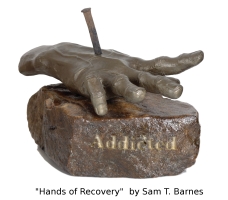This article was written by Eve Pearce, who recently wrote to ask if I would publish a word about art therapy in addiction recovery. She remarked that while writing articles for Coalition Against Drug Abuse, she was inspired by the healing power of the arts. She wrote, “everything from exploring poetry to painting and pottery – had shaped people’s lives and offered many an important tool to aid their recovery.”
Art IS therapeutic. I agree that this is an important message, so if you would, please share this in the hopes that it reaches someone who is struggling with addiction or abuse.
Without further adieu…

Sam T. Barnes
________________________
The Power of Art
This is because we can reach inside ourselves and visualize our emotions and anxieties much more easily and transfer them onto a blank canvas than we can put them into words. Art is a powerful form of expression; it allows us to externalize, to vent and to heal all through creativity. Similarly, studies have found that writing poetry can also have a beneficial effect, or playing music. Whatever we are feeling that we cannot communicate on the outside, can be explored through creativity and, most effectively, through art.
Art therapy takes place in a safe, comfortable environment and this helps to empower and relax the participant and is the start of the healing process. Whether you are in a group situation or having a one-to-one session, research shows that the act of creating art can be highly beneficial to sufferers of addiction.
What is Art Therapy?
The main thing to understand is that you don’t need any skill in art to benefit from art therapy. This form of psychotherapy is open to absolutely anyone suffering from addiction or depression and it works through a three way process; art therapy is concerned with the relationship between the sufferer, the therapist and the ‘image’. The image is important, not to be assessed, but as a tool with which the sufferer can express themselves as freely as they wish, without any inhibitions. Art therapists work with groups and individuals, with adults and in children’s centers. They also work in prisons.
Using art as the primary form of communication tends to be successful at breaking down barriers that exist verbally and, as well as enabling easier self expressionism, it can heighten the sufferer’s mood as they create color and emotion with a paint brush, or produce artefacts from clay. Art therapy is ideal for those struggling to express themselves because of pent up feelings caused by addiction issues and also mental health issues.
An Online Network
Organizations exist to support addiction and to promote its relationship with art as a form of therapy. By platforming this model of support, the notion of art as being able to help with addiction, as well as mental disorders, is promoted to the general public and members of therapy groups, creating a network of support.
The American Art Therapy Association connects the public and its members to organizations around the world, and supports both state and federal initiatives for this type of venture, as well as recognizing the efforts of those involved with art therapy. There are websites, which take you through art projects that have helped sufferers with their addiction issues, from creating buttons for addictions to explaining about letting go rituals and creating a journal. These rituals show how art and the process of creating something can alleviate the stress of addiction, from distraction to the idea of letting go. The National Coalition of Creative Arts Therapies Associations is a collaboration of organizations that use the art as therapy model and detail upcoming events on their website, such as Arts Advocacy Day.
Stopping Addiction
As well as Arts Therapies Associations, there are many Detox Treatment Centers throughout America offering help to addiction sufferers. These facilities are assessed thoroughly to ensure they meet the appropriate standards of care and websites such as Project Know detail the different types of addiction and the treatment offered for each with help lines listed. Aftercare includes therapy, meaning that the support continues which is an important factor for addiction sufferers. Alcohol and drug dependency is a significant problem in the U.S and with the support of Treatment facilities and Art Therapy organizations, it is one that is being addressed. With addiction, the issue is not just how to stop; it is about understanding why it happens and how you can deal with it effectively and on an on-going basis. Art therapy gives sufferers the tools to fight addiction through self-expression, through the process of creating something that shows the world how they feel, because, ultimately, art is power.
